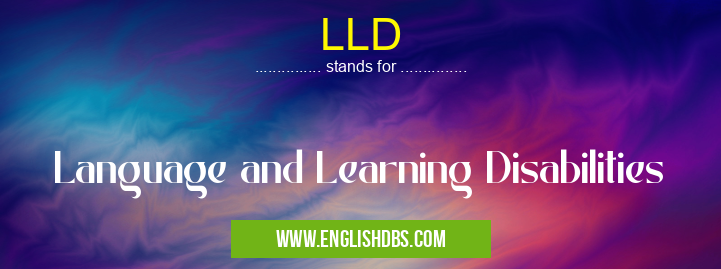What does LLD mean in DISABILITY
The exact causes of LLD are not fully understood, but genetic factors, prenatal complications, and environmental influences are believed to play a role. Some common causes may include:

LLD meaning in Disability in Medical
LLD mostly used in an acronym Disability in Category Medical that means Language and Learning Disabilities
Shorthand: LLD,
Full Form: Language and Learning Disabilities
For more information of "Language and Learning Disabilities", see the section below.
» Medical » Disability
Causes of LLD
- Genetic disorders (e.g., Down syndrome, Fragile X syndrome)
- Brain injuries (e.g., traumatic brain injury, stroke)
- Prenatal exposure to toxins or infections
- Environmental factors (e.g., poverty, lack of educational opportunities)
Types of LLD
LLD can present in various forms and affect different areas of learning. Some common types include:
- Dyslexia: Difficulty with reading and decoding written words
- Dysgraphia: Difficulty with writing and forming letters
- Dyscalculia: Difficulty with math and numerical concepts
- Auditory Processing Disorder: Difficulty processing and understanding spoken language
- Developmental Language Disorder: Difficulty acquiring and using language
Symptoms of LLD
The symptoms of LLD can vary widely and may include:
- Difficulty reading and understanding written material
- Poor handwriting and spelling abilities
- Slow and labored writing
- Problems with comprehension and following directions
- Difficulty with math concepts and calculations
- Speech and language difficulties, such as stuttering or difficulty expressing ideas
- Poor memory and organizational skills
Diagnosis and Assessment
Diagnosing LLD requires a comprehensive assessment by a qualified professional, such as a speech-language pathologist, psychologist, or educational specialist. The assessment typically involves:
- Medical and developmental history
- Educational history and current academic performance
- Observations and interviews
- Standardized tests and diagnostic measures
- Physical and neurological examination (if necessary)
Treatment and Management
Treatment for LLD focuses on improving the individual's language and academic skills through targeted interventions and accommodations. Common treatment options may include:
- Speech-language therapy: To improve language comprehension, expression, and speech production
- Educational therapy: To provide individualized instruction and support in reading, writing, math, and other academic areas
- Occupational therapy: To promote motor skills and handwriting abilities
- Assistive technology: To support learning with specialized tools and software
- Accommodations: Modifications to the learning environment or testing procedures to reduce barriers
Essential Questions and Answers on Language and Learning Disabilities in "MEDICAL»DISABILITY"
What are Language and Learning Disabilities (LLD)?
LLD are a group of disorders that affect one or more of the following: language processing, reading, writing, math, and nonverbal learning. These disorders can make it difficult for individuals to succeed in academic and social settings.
What are the signs and symptoms of LLD?
Symptoms of LLD can vary depending on the specific disorder, but may include difficulty with: Reading, writing, spelling, understanding or using language, math, social skills, and nonverbal communication.
How are LLD diagnosed?
LLD are typically diagnosed through a comprehensive evaluation by a qualified professional, such as a psychologist or speech-language pathologist. The evaluation may include tests of cognitive abilities, academic skills, and language processing.
What are the treatments for LLD?
Treatment for LLD typically involves a combination of therapies, such as speech therapy, occupational therapy, behavioral therapy, and educational interventions. The specific treatment plan will depend on the individual's specific needs and abilities.
Can LLD be prevented?
While the exact cause of LLD is unknown, certain risk factors can increase the likelihood of developing these disorders, such as premature birth, low birth weight, and exposure to toxins. There is no sure way to prevent LLD, but early identification and intervention can help minimize their impact.
What are the long-term effects of LLD?
With appropriate support and intervention, individuals with LLD can learn to manage their challenges and live fulfilling lives. However, they may experience ongoing difficulties in certain areas, such as academic achievement, employment, and social interactions.
Final Words: Language and Learning Disabilities are complex conditions that can significantly impact an individual's academic and social development. Early diagnosis and appropriate intervention are crucial for maximizing the individual's potential and improving their quality of life. With the right support and accommodations, individuals with LLD can overcome challenges and succeed in school, work, and other areas of life.
LLD also stands for: |
|
| All stands for LLD |
